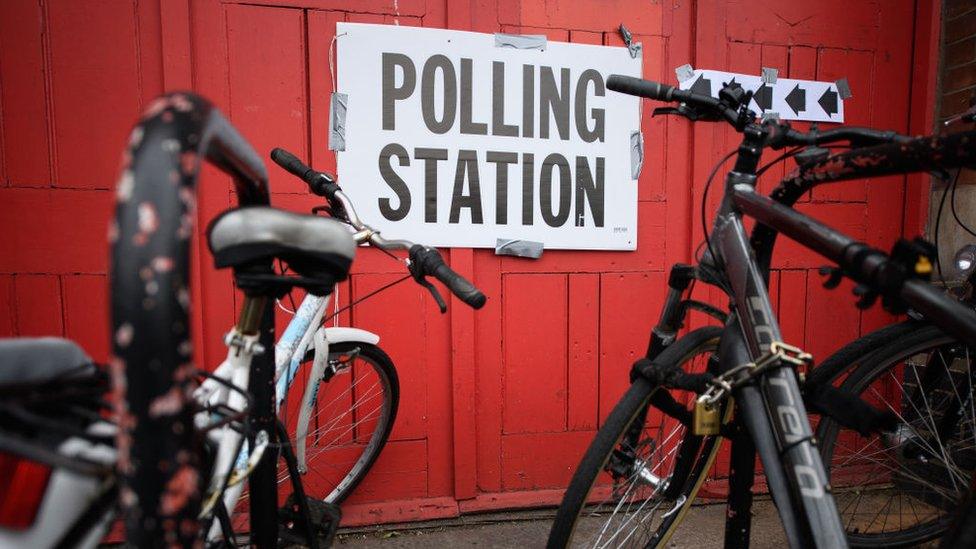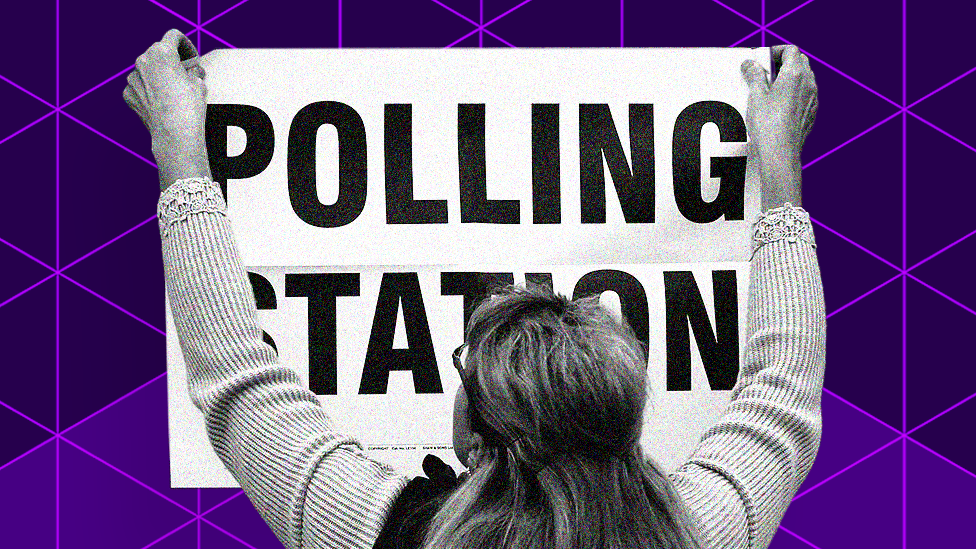Curtice: All eyes on Tory performance at the local elections

- Published
A local election of some kind is being held everywhere in England and Wales on Thursday 2 May.
The contests – including council, mayoral and police and crime commissioner (PCC) elections – will be the last occasion voters are asked to go to the polls before the general election.
They will be heavily scrutinised for clues as to the prospects for the parties when the time comes to choose the next government.
True, not everyone votes the same way in local elections as they would in a general election – about one in five people do not.
Shifting fortunes
As a result, the Liberal Democrats and Greens, in particular, typically outperform their current standing in the national polls.
Nevertheless, the rises and falls in party support in the local ballot boxes typically reflect the ups and downs in the parties’ standings in the polls.
Most of the elections on 2 May are for seats that were previously contested three years ago, in May 2021.
The electoral climate was very different then.
The Conservatives were six points ahead of Labour in the national polls.
They achieved the rare feat for an incumbent government of making net gains in local elections – including 13 councils and more than 200 council seats.
Labour had a disappointing night, losing more than 300 seats as well as a parliamentary by-election in heavily pro-Leave Hartlepool.
Reform UK, the rebranded Brexit Party, was at just 3% in the polls.
Now, the Conservatives are 20 points behind Labour, while Reform is averaging 12%.
Election poll tracker: How do the parties compare?
- Published3 July 2024
When are the local elections and who can vote?
- Published2 May 2024
Eyes on mayoral fortunes
Inevitably this contrast has fuelled expectations that the Conservatives could suffer significant losses.
One projection,, external from local election experts Colin Rallings and Michael Thrasher, has suggested the party could lose up to half the just under 1,000 council seats it will be trying to defend.
While the Conservatives are defending overall control of only 16 councils, their grip is potentially at risk in half a dozen of them, including Basildon, Dorset, Harlow and Redditch.
Their grip on the position of PCCs could also be lost in about one in three of the 29 contests where the party won last time.
It is, though, hoping for some good news from at least some of the metro mayoral contests, centred on Birmingham, Leeds, Liverpool, Manchester, Newcastle and Sheffield.
Ben Houchen, the Conservative Mayor in Tees Valley, won a spectacular 73% of the vote in 2021, an apparent testament to his personal popularity.
However, a recent poll by consultants Redfield and Wilton, external suggests the result this time around could be close.
The Conservatives are also hoping that their standard-bearer in the West Midlands, Andy Street, will be able to hang on to his position, where, again, some polling, external suggests the winning margin could be narrow.
The party is favourite to win the new mayoralty in York and North Yorkshire.
Councils to watch in the 2024 local elections
- Published18 April 2024
Another lifeline for the party may come from the fact that Reform is making a limited appearance on the local ballot papers.
According to the national polls, Reform is now the most popular choice of 2019 Conservative voters who have defected.
But Reform is contesting one in six of the council wards, and only a couple of the police and mayoral contests. So perhaps some of the voters who do not have a local Reform candidate will revert back to voting Conservative.
However, Reform is fighting all the wards in heavily pro-Brexit Hartlepool and Sunderland, in both of which UKIP has previously had some success in winning local votes and seats.
Its presence in Hartlepool could make it easier for Labour to pick up the Conservative-held seats it needs to gain overall control.
Labour already has overall control of 43 of the local councils where elections are being held. That, together with the fact that in most councils only one-third of the council seats are up for election, limits its chances of making headline-grabbing gains.
Apart from Hartlepool, one possibility that might be within its reach is Dudley, where, exceptionally, all of the seats are being contested this year.
That helps explain why winning the Tees Valley and West Midlands mayoral elections would be as valuable to Labour as defending them successfully would be for the Conservatives.
Otherwise, according to Messrs Rallings and Thrasher,, external Labour might secure 300 or so extra council seats, while the polls suggest the party’s standard-bearer in London, Sadiq Khan, is on course to win a third term as the capital’s mayor.
The Liberal Democrats and the Greens will also hope to make advances, again not least at the Conservatives’ expense.
The Liberal Democrats has its eyes on winning control of Brentwood and Wokingham. The Greens’ top target is to advance its already strong position in Bristol, and especially in the city’s new Central constituency, which the party hopes to win in the general election.
But all eyes will primarily be on just how well or badly the Conservatives do.
John Curtice is Professor of politics, University of Strathclyde and Senior Research Fellow, Scottish Centre for Social Research and The UK in a Changing Europe. He is also co-host of the Trendy podcast.
More on council elections
- Published7 May 2024

- Published29 April

- Published4 July 2024
